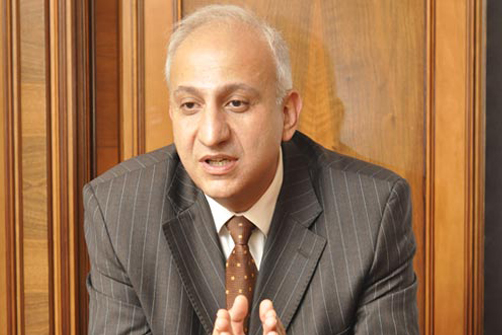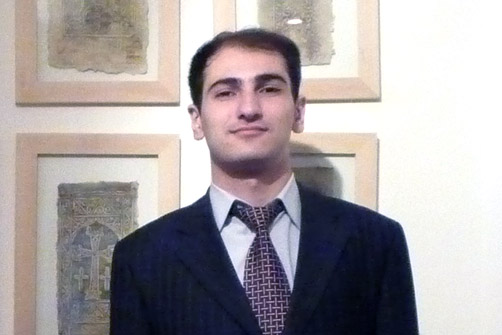-

General Director of “Cornet-AM” Company Boris Demirkhanyan
10:38 | 17.11.10 | Interviews | exclusive 10660
“Integration of landline and mobile businesses aims at creating a multi-service operator”
Interview of General Director of “Cornet-AM” Company Boris Demirkhanyan to Mediamax News Agency and Itel.am portal
- In late October, “Cornet-AM” launched pilot operation of WiMAX network in Tsakhkadzor, built on the equipment of Intracom Telecom Company. Tsakhkadzor became the 22nd town of “Cornet-AM” network presence and the first, where the network is launched on the basis of the new equipment. What was the reason of shifting to the new equipment?
- In reality, now the issue of the entire company’s transition to new equipment is not on the agenda: it is more of an assessment of prospects and capacities. Historically, “Cornet-AM” network was built on the equipment of one producer – Airspan Communications. This is not always optimal in operational terms, since, for instance, if there is a mistake in the system, it may influence the work capacity of the entire network. Besides, if the producer of the equipment considers itself leaving no alternative, it usually forms its relations with the connection operation in a corresponding way, and this leads to particular difficulties. I should make a reservation: this does by not means imply that our company is not content with the equipment and the work of the supplier, but it does not rule out the use of alternatives. Since the Greek “Intracom Telecom” Company, represented by the subsidiary “Intracom Armenia” Company, stated the launch of new generation WiMAX base station’s production for our frequency range, we could not but use the opportunity.
“Pilot” project implies testing the new equipment in the range of 3,6-3,8GHz frequencies, which are at the disposal of “Cornet-AM”, as well as integration of this equipment into the core of our network. Given successful completion of the “pilot” project, the company will receive access to alternative equipment for further expansion of the network.
The new base station was installed in Tsakhkadzor. Why exactly there? Any new solution requires extreme conditions of probation, and Tsakhkadzor, as a small town, has a quite complex landscape, and, in addition, active construction is in process there.
Besides, there are two peaks of activity in Tsakhkadzor, when a huge number of people gather in a quite small area: summer and winter. At the same time, there are the so-called “anti-peaks” observed in Yerevan: in summer, which is the season of vacations, and in winter – on New Year Holidays. Thus, compensation for the decline of activity in Yerevan at the expense of increasing presence in resort zones leads to more efficient operation of our telecommunication resources. I believe that it will be logical, if we realize another “pilot” project in Jermuk.
After the launch of WiMAX network in Tsakhkadzor, “Cornet-AM” made interesting price offers: unlimited internet access at the speeds of 1, 2 and 3Mbps respectively for 10, 20 and 30 thousand AMD per month. What segment of the market is this offer targeted to?
- “Cornet-AM” has initially been and remains targeted at the corporate segment. We realize that today there are many more convenient technological solutions in the market of mass internet access for personal use, like, for instance, 3G. However, there is a segment of interest for us also in the market of individuals, which, as to the volume and specificities of consumed services, verges on corporate customers.
Everything was simple before: individual subscribers needed three things: internet surfing, social networks and Skype. Now, more and more private users create their own web-pages, form their own VPN-networks, and for that, the services on the basis of WiMAX technology are more preferable. At that, convenience and speed of service provision by means of wireless broadband access networks conveniently positions our offers in the market. 1Mb service is meant exactly for the mentioned part of the users.
Concerning higher speeds for data transfer, as far as I know, this offer does not have analogues in Tsakhkadzor and aims mainly at the sector of legal entities, which is quite actively developing in the region over the past few years.
- How easily do Armenian enterprises agree to work with wireless access operators?
- Everything, in the final end, rests against information security. Initially, the choice of technologies for “Cornet-AM” network was defined by requirements towards information security. The company consistently developed network capacities and technologies to the level of telecommunication community, however “the point of trust”, I believe, can be considered the moment, when a few years ago “Cornet-AM” certified the right for use of wireless broadband access technologies in order to connect ATM terminals to ArCa processing center. This very strongly changed the understanding and the approach of the users towards wireless technologies.
The main advantages of wireless technologies are obvious: fast speed of service provision, wide coverage zone and mobility. On the other hand, we can solve the tasks of the customers up to a certain limit, and the limit is defined by the speeds, which the customer needs. This is why, when the customer – a corporate entity or an individual – “outgrows” the transmission capacity that the wireless technology can provide, the solution for him is the transition to optical channels and technologies, which will provide for network access with the speeds over 10Mbps. We have been observing this process in Armenia over the past few years and are glad, since this means that information technologies more and more become an inseparable part of our life. At that, even basing on the example of our company, I can note that transition to wired technology by a particular customer, as a rule, does not mean renouncing wireless broadband access, which continues serving as a reserve, additional solution, as it has been done by a number of our old customers.
- Can one assume that, as compared to Icon Communications, “Cornet-AM” has not much suffered from the entry of 3G technology internet providers to the market?
- It is difficult for me to compare. Arrival and active promotion of mass access services on the basis of 3G technology could not but influence the average level of prices in the direction of reduction. This touches upon not only providers of wireless broadband access providers, but also all players in the market. “Cornet-AM” in this sense is not an exception at all, however, as I have already mentioned, we work in a different segment. The company’s orientation towards corporate customers, as well as availability of the network and services in the regions, has to a certain degree allowed stabilizing the situation. Although recently, the share of private customers of “Cornet-AM” has been increasing, the main share in the company’s proceeds is still formed by the corporate segment. At that, the company’s customer base increases by 25% a year on average.
- What volume of investments is made by the company and how is their recoupment secured, taking into account the fact that “Cornet-AM” operates in 22 towns of Armenia, the market of the majority of which is incomparably small?
- In the period from 2008 to 2010, over USD 5.5mln has been invested in construction of the network, and the process continues. At that, the company consistently carries out a policy of expanding the network and its modernization in order to meet the demand of the market. By realizing the concept of national access network, operating all over Armenia’s territory, we were aware of the fact that the demand for services in various regions differs. This is why there is no meaning in speaking of “recoupment” of the access network in individual town or region with the population of 10-20 thousand people, and even in larger towns. It is more correct to assess the results as to the entire network as a whole.
By starting WiMAX network operation in late 2008, we have been trying to keep to a prospective plan, meant for 5 years. Even in conditions of the financial crisis and the changes in the market, given conditions of preservation of growth tendencies for the service demand, I hope that “Cornet-AM” will occupy its deserved place in the list of successful projects in Armenia.
- The company was going to start provision of landline telephony services. What is the reason for delay?
- In 2010, “Comstar-OTS” OJSC, which we also enter, moved under the management of MTS Group, which also works in the Armenian market and known to many as the mobile operator VivaCell-MTS.
Now we are elaborating the concept of unified provision of services, including services of landline telephony.
- Does this mean possible merger of “Cornet-AM” and “VivaCell-MTS” companies into a universal connection operator?
- That is one of the possible scenarios of development of events. In general, integration of landline and mobile businesses aims exactly at creating such a multi-service operator.
- Today a situation has formed in the market of internet services in Armenia, where operators, instead of reducing prices, offer more services at the previous cost. What is the tendency conditioned by?
- I believe that low price offers, which are in the Armenian market, do not always correspond to capital expenses and operational expenses of providers. But it is not dumping yet, but the natural wish to maintain the volume of the customer base in conditions of the limited market.
The most capital-intensive factor in the process of telecommunication network construction is the access network. The tariff “for the customer” should contain the investment component, which, first of all, provides for recoupment of already made investments and further development of the access network. This is what stimulates and provides for stable growth of the number of customers and the volume of services.
However I believe that what takes place in the market today doers not always meet the laws of economy in terms of building telecommunication networks. In pursuit of customers, providers often neglect the need for development of the network. This is why, unfortunately, one should not expect dynamic development of alternative access networks in Armenia within the nearest few years, I believe. Randomly reducing the prices, operators risk getting the opposite effect: slow recoupment of investments will not contribute to increase of the customer base, and the fact, in its turn, could stimulate reduction of customer tariffs.
But the quality of provided services is of greater concern. There are certain rules, proven by time and international practice and described in the recommendations of the International Telecommunication Union, which link the acceptable threshold of natural multiplexing to the number of active subscribers. Increase of the volume of provided services, given preservation of the cost of the latter, most often is provided due to more loaded operation of the access network, which, unfortunately, may serve as a result for reduction of quality indices. One should agree that there are not that many service providers in Armenia, capable of boasting a subscribers base, consisting of 20 thousand and more subscribers, which would allow applying maximum allowed level of multiplexing. Increase in the volumes, given preservation of the cost of the services, leads to natural reduction of the marginality of business, and this, in its turn, leads to impossibility of adequate development of networks.
- Does that mean that one should not expect further reduction of prices in the nearest future?
- It seems to me, yes, if, of course, someone does not take up open dumping steps, which I would not like to happen. The market of internet providing in Armenia is a liberalized market, however it seems to me that regulating bodies, in particular, the Public Services Regulatory Committee, could analyze the structure of price formation for internet access services more deeply. Each technology, given attractiveness for solution of particular tasks, possesses particular specificity, and this specificity should be taken into account, while forming the concept for infrastructure development at a country level.
At that I am deeply convinced that the operators themselves should analyze the economy of network construction more deeply, and then they will come to understanding of the fact that it is impossible to provide for impetuous development, given current tariffs.

17:29 | 24.09.25 | Articles
Jacopo Losso on Cross-Border Investments and Why Armenia Attracts Angels







